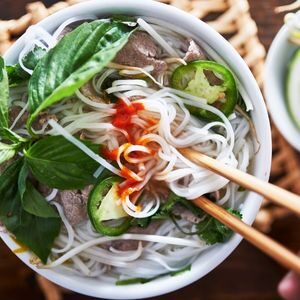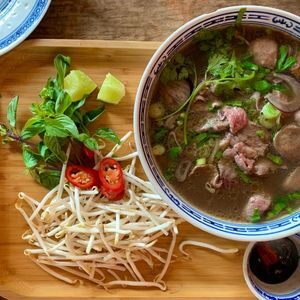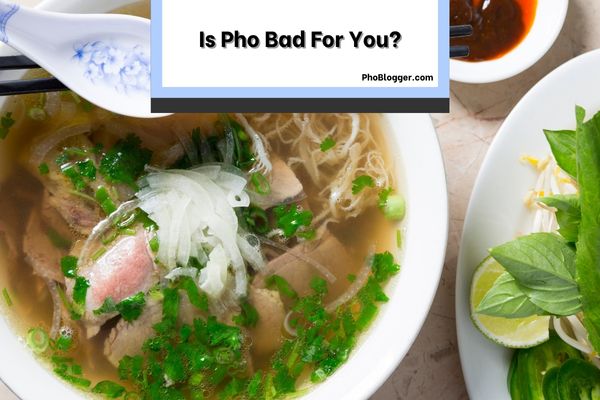Pho is a Vietnamese noodle soup dish that has recently gained immense popularity in Western culture. While it is widely considered a delicious and comforting dish, there is growing concern about whether it is a healthy choice.
This article aims to explore the nutritional composition of pho, the potential health risks associated with its consumption, and its impact on specific health conditions. By examining the evidence, we hope to answer the question: is pho bad for you?
Before you scroll down this guide, “Is Pho Bad For You,” you can check out these other recent pho-related articles from our team at Pho Blogger:
Nutritional Composition of Pho

Pho is a hearty soup made with various ingredients, such as rice noodles, herbs, and meat. The nutritional composition of pho can vary depending on the specific recipe and ingredients used. However, pho is generally a relatively low-calorie, nutrient-dense dish that can provide several health benefits.
- Macronutrients: Pho typically contains a balance of macronutrients such as protein, carbohydrates, and fats. The protein in pho comes from the meat used in the dish, usually chicken or beef. Rice noodles are the primary source of carbohydrates in pho, while the fat content comes from the broth used to make the soup.
- Micronutrients: Pho is also rich in several micronutrients, including vitamins and minerals. The herbs and spices used in pho such as basil, coriander, and ginger provide various health benefits due to their antioxidant and anti-inflammatory properties. Additionally, the vegetables used in pho such as bean sprouts, onions, and peppers are good sources of vitamins and minerals.
- Health Benefits: Pho is a nutritious dish with several health benefits. The combination of protein and carbohydrates in pho can help regulate blood sugar levels and keep you feeling full for longer. The herbs and spices used in pho have anti-inflammatory properties that can help reduce the risk of chronic diseases such as heart disease and cancer. Additionally, the broth used in pho is rich in collagen, which can help improve skin health and reduce joint pain.
Overall, pho is a nutrient-dense dish that can provide several health benefits. However, it is important to note that the specific nutritional composition of pho can vary depending on the recipe and ingredients used.
More Pho-Related Guides: Is Pho Fattening and Is Pho Gluten-Free?
Potential Risks of Pho

While pho is generally considered a healthy dish, some potential health risks are associated with its consumption.
- Sodium Content: One of the primary concerns with pho is its high sodium content. The broth used to make pho is often seasoned with fish sauce and soy sauce, both high in sodium. Additionally, some restaurants may add extra salt to the broth. High sodium intake can increase the risk of high blood pressure and other related health problems.
- Additives and Preservatives: Some pre-packaged pho broths or sauces may contain additives and preservatives, such as monosodium glutamate (MSG), which can cause adverse reactions in some people. It is important to read the ingredients list and choose broths and sauces that do not contain any unwanted additives.
- Contaminants: In some cases, pho may be contaminated with harmful bacteria, such as Salmonella or E. coli. This can occur if the ingredients are not handled or cooked properly. Ensuring the pho is prepared and cooked safely and hygienically is essential.
It is important to note that these risks are not unique to pho and can be present in any food if not prepared or consumed correctly. Choosing high-quality ingredients and consuming pho in moderation is crucial to avoid any potential health risks.
More Pho-Related Guides: How to Reheat Pho and Is Pho a Breakfast Food?
Pho and Specific Health Conditions

Pho can positively and negatively affect specific health conditions, depending on the ingredients and preparation methods used.
- Gluten Sensitivity: Pho is typically gluten-free, as it is made with rice noodles instead of wheat-based noodles. However, it is important to confirm that the broth and sauces used in the pho are also gluten-free to avoid any potential issues for individuals with gluten sensitivity or celiac disease.
- High Blood Pressure: As mentioned earlier, pho is high in sodium, which can increase blood pressure levels. Individuals with high blood pressure should be cautious when consuming pho and may want to limit their intake or choose low-sodium broth and sauces.
- Diabetes: Pho can be a suitable meal option for individuals with diabetes due to its high protein and low glycemic index content. However, individuals with diabetes should be mindful of the sodium content and choose low-sodium options to manage their blood pressure levels.
Pho can be a healthy option for individuals with specific health conditions. Still, it is essential to be mindful of the ingredients and preparation methods to ensure it fits into an individual’s dietary requirements.
More Pho-Related Guides: What is Pho Tai and Is Pho Japanese?
Conclusion For “Is Pho Bad For You”

In conclusion, pho is a popular Vietnamese soup dish that is generally considered to be a nutritious and delicious meal. While it can provide several health benefits, some potential risks are associated with its consumption. These risks include its high sodium content, additives, preservatives, and the possibility of contamination. However, these risks can be mitigated by selecting high-quality ingredients, choosing low-sodium options, and ensuring the pho is prepared and cooked safely.
Ultimately, whether or not pho is “bad” for you depends on individual dietary requirements and preferences. Pho can be a healthy and balanced meal option if consumed in moderation and prepared with nutrient-dense ingredients. As with any food, consuming pho in a balanced and varied diet is important to ensure optimal health and well-being.
If you find this guide, “Is Pho Bad For You,” helpful, you can check out these other pho-related recommendations from our team:
- Pho in Cerritos: Best Restaurants
- Best Pho Restaurants in Colorado Springs
- Best Pho Restaurants in San Diego, California
You can learn more about whether pho is bad for you by watching “How Bad is Pho” from Ask About HEALTH down below:

